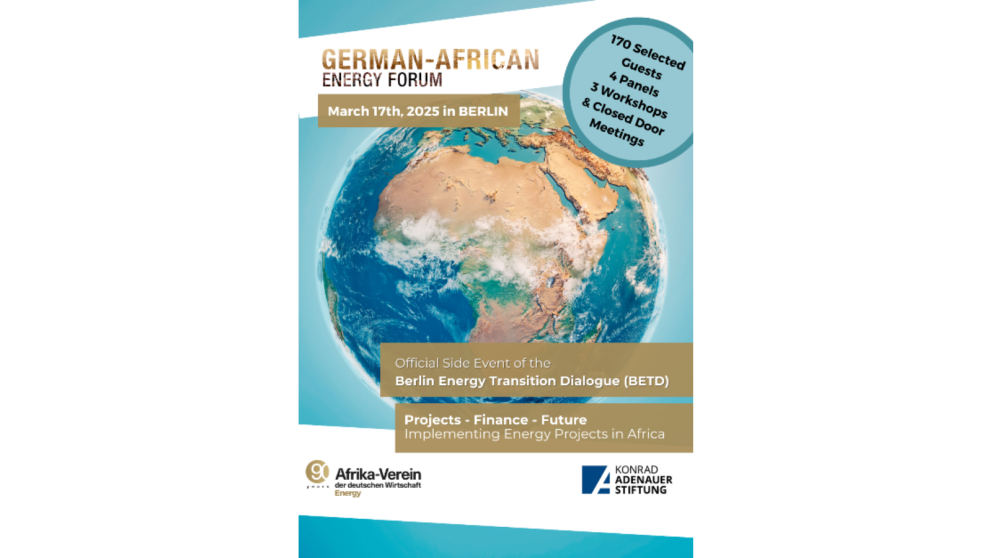Workshop: Sustainable Hydrogen in Africa – Opportunities and Challenges

Date and Time: 17 March 2025 – 1:00 PM (CET)
Venue: Konrad-Adenauer-Stiftung, Tiergartenstraße 35, 10785 Berlin
Organized in Collaboration with: German-African Business Association (Afrika-Verein der Deutschen Wirtschaft) as part of the German-African Energy Forum
Registration: Open to registered participants of the Energy Forum
In brief
As part of the German-African Energy Forum and an official side event of the Berlin Energy Transition Dialogue (BETD), the Research Institute for Sustainability at GFZ is organizing a panel discussion to explore the opportunities and challenges of promoting sustainable hydrogen production in Africa. The panel will discuss the state-of-play of regulations, certification schemes, and sustainability criteria in project finance and what they mean for hydrogen development on the continent.
Background
Green hydrogen is widely regarded as a key component in a future net-zero economy by replacing fossil fuels in critical sectors like steel, cement, and chemicals production. Countries like Germany are expected to depend heavily on hydrogen imports from abroad, creating significant export opportunities for African regions abundant in renewable energy sources. These opportunities could be further amplified as industries may choose to relocate parts of their operations and value chain directly to renewable-rich areas.
However, the rapid scale-up of hydrogen production to meet global demand can also lead to considerable environmental and socio-economic impacts, particularly concerning land and water use. If poorly managed, these challenges could hinder acceptance and create potential conflicts, negatively affecting local communities and their livelihoods.
Implementing robust sustainability governance—such as certification schemes—can mitigate these risks, ensuring hydrogen development is both environmentally and socially responsible. These mechanisms also provide guidance for investors and financiers in selecting projects that align with sustainability objectives.
Objectives
In this session, the Research Institute for Sustainability at GFZ Potsdam aims to facilitate dialogue among key stakeholders in the African and European hydrogen economy. The session will focus on sustainability challenges and explore effective governance approaches to address the needs of diverse stakeholders, including local communities, project developers, investors, and buyers. It will also present the current state-of-play of sustainability governance in the hydrogen sector and discuss key opportunities and challenges for their effective implementation.
Key questions to be addressed include
- What sustainability-related requirements, from regulatory and private initiatives, must be met for hydrogen exports to markets in Europe and elsewhere?
- How do governance mechanisms like certifications and standards currently support sustainability in the hydrogen sector, particularly in Africa?
- What challenges and opportunities arise in establishing hydrogen value chains in Africa while complying to sustainability safeguards?
Format, Panel, and Duration
The session will begin with input from an RIFS expert on sustainability governance, followed by a moderated discussion among representatives from key stakeholders involved in shaping the hydrogen economy in Africa (representing project developers, policy advisory in Africa, finance experts, and a certification scheme). This will lead into an open discussion with the workshop audience. Duration: 60 minutes.
Participation & Registration
Only registered members of the German-African Energy Forum may participate in this session.
For more information on the Forum, click here
For registration to the Forum, please click here
Contact:
Workshop Content:
Maximilian Rischer – maximilian [dot] rischer [at] rifs-potsdam [dot] de
Organizational:
Maximilian Rischer and Khadi Camara – camara [at] afrikaverein [dot] de (camara[at]afrikaverein[dot]de)
This event receives funding support from the German Federal Foreign Office within the context of the project ‘Geopolitics of the Energy Transformation: Sustainability Governance in the Hydrogen Sector’